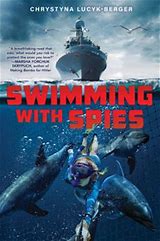Swimming with spies by Chrystyna Lucyk-Berger Swimming with Spies , a junior historical fiction selection, is a timely read as it is related to the current war between Ukraine and Russia. The author, Chrystyna Lucyk-Berger, was born to Ukrainian parents who immigrated to America. This page-turning, highly emotional novel took place in 2014 at a dolphinarium in the eastern part of Ukraine, in the province of Crimea, which was being invaded and occupied by Russia during that time frame.
Sofiya, a motherless teen, and her father, Tato, managed the dolphinarium. They loved and taught the dolphins to respond to human commands by teaching them sign language. When the Russians invaded, the Russian leaders were going to close the dolphinarium and transport the dolphins and other sea animals to the Artic and Black Sea to plant and detect explosive mines and to spy on ships.

Sofiya and her middle school Ukrainian friends, as well as Sofiya’s middle school Russian rivals, united in an attempt to come up with a plan to save the sea animals. What was it? Were they successful..
.or doomed? How did Sofiya become motherless, and what did it have to do with one of her Russian rivals? If you are interested in dolphins, Swimming with Spies has much information for you about these sea animals and others. The “Author’s Notes” at the back of the book will inform you as to what is fiction and what is not fiction in the story.
There is also a glossary of Ukrainian and Russian words as well as Dolphin Terminology. Enjoy! Comments are not available on this story. Read more about why we allow commenting on some stories and not on others.
We believe it’s important to offer commenting on certain stories as a benefit to our readers. At its best, our comments sections can be a productive platform for readers to engage with our journalism, offer thoughts on coverage and issues, and drive conversation in a respectful, solutions-based way. It’s a form of open discourse that can be useful to our community, public officials, journalists and others.
We do not enable comments on everything — exceptions include most crime stories, and coverage involving personal tragedy or sensitive issues that invite personal attacks instead of thoughtful discussion. You can read more here about our commenting policy and terms of use . More information is also found on our FAQs .
Show less Send questions/comments to the editors..
Top

Kids’ Book Review: ‘Swimming with Spies’

Swimming with Spies, a junior historical fiction selection, is a timely read as it is related to the current war between Ukraine and Russia. The author, Chrystyna Lucyk-Berger, was born to Ukrainian parents who immigrated to America. This page-turning, highly emotional novel took place in 2014 at a dolphinarium in the eastern part of [...]











